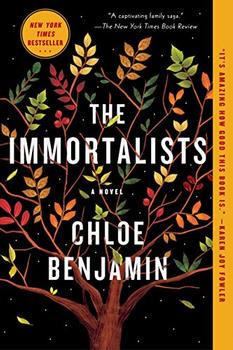Summary | Excerpt | Reading Guide | Reviews | Beyond the Book | Readalikes | Genres & Themes | Author Bio

A Novel
by Chloe Benjamin
This is not their usual arrangement, for Gertie has always babied Simon more than the others. She wanted, once, to be an intellectual; she lay beside the fountain in Washington Square Park reading Kafka and Nietzsche and Proust. But at nineteen, she met Saul, who had joined his father's business after high school, and she was pregnant by twenty. Soon Gertie withdrew from New York University, where she was on scholarship, and moved into an apartment mere blocks from Gold's Tailor and Dressmaking, which Saul would inherit when his parents retired to Kew Gardens Hills.
Shortly after Varya was born—far sooner than Saul thought necessary, and to his embarrassment—Gertie became the receptionist at a law firm. At night, she was still their formidable captain. But in the morning, she put on a dress and applied rouge from a little round box before depositing the children at Mrs. Almendinger's, after which she exited the building with as much lightness as she had ever been capable. When Simon was born, though, Gertie stayed home for nine months instead of five, which turned into eighteen. She carried him everywhere. When he cried, she did not respond with bullish frustration but nuzzled him and sang, as if nostalgic for an experience she had always resented because she knew she would not repeat it. Shortly after Simon's birth, while Saul was at work, she went to the doctor's office and returned with a small glass pill bottle—Enovid, it read—that she kept in the back of her underwear drawer.
"Si-mon!" she calls now, in a rich long blast like a foghorn's. "Hand me that," she might say, lying in bed and pointing to a pillow just past her feet. Or, in a low, ominous tone: "I have a sore; I've been lying too long in this bed," and though Simon internally recoils, he examines the thick wedge of her heel. "That isn't a sore, Ma," he replies. "It's a blister." But by then she has moved on, asking him to bring her the Kaddish, or fish and chocolate from the shiva platter delivered by Rabbi Chaim.
Simon might think Gertie takes pleasure in commanding him, if not for the way she weeps at night—snuffled, so her children don't hear, though Simon does—or the times he sees her curled fetal on the bed she shared with Saul for two decades, looking like the teenager she was when she met him. She sits shiva with a devoutness Simon did not know she could muster, for Gertie has always believed in superstition more than any God. She spits three times when a funeral goes by, throws salt if the shaker falls over, and never passed a cemetery while pregnant, which required the family to endure constant rerouting between 1956 and 1962. Each Friday, she observes the Sabbath with effortful patience, as if the Sabbath is a guest she can't wait to get rid of. But this week, she wears no makeup. She avoids jewelry and leather shoes. As if in penitence for the failed kriah, she wears her black sheath day and night, ignoring the crust of brisket drippings on one thigh. Because the Golds own no wooden stools, she sits on the floor to recite the Kaddish and even tries to read the book of Job, squinting as she holds the Tanakh up to her face. When she sets it down, she appears wild-eyed and lost, like a child in search of her own parents, and then comes the call—"Si-mon!"—for something tangible: fresh fruit or pound cake, a window opened for air or closed against draft, a blanket, a washcloth, a candle.
When enough guests have assembled for a minyan, Simon helps her into a new dress and house slippers, and she emerges to pray. They're joined by Saul's longtime employees: the bookkeepers; the seamstresses; the pattern makers; the salesmen; and Saul's junior partner, Arthur Milavetz, a reedy, beakish man of thirty-two.
As a child, Simon loved to visit his father's shop. The bookkeepers gave him paper clips to play with, or pieces of scrap fabric, and Simon was proud to be Saul's son—it was clear, by the reverence with which the staff treated him and by his large windowed office, that he was someone important. He bounced Simon on one knee as he demonstrated how to cut patterns and sew samples. Later, Simon accompanied him to fabric houses, where Saul selected the silks and tweeds that would be fashionable next season, and to Saks Fifth Avenue, whose latest styles he purchased to make knockoffs at the shop. After work, Simon was allowed to stay while the men played hearts or sat in Saul's office with a box of cigars, debating the teachers' strike and the sanitation strike, the Suez Canal and the Yom Kippur War.
Excerpted from The Immortalists by Chloe Benjamin. Copyright © 2018 by Chloe Benjamin. Excerpted by permission of G.P. Putnam's Sons. All rights reserved. No part of this excerpt may be reproduced or reprinted without permission in writing from the publisher.
Your guide toexceptional books
BookBrowse seeks out and recommends the best in contemporary fiction and nonfiction—books that not only engage and entertain but also deepen our understanding of ourselves and the world around us.